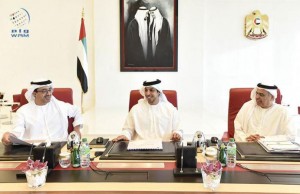 The United Arab Emirates (UAE) approved a zero deficit federal government budget on Sunday as oil prices continue to be low. The estimated dh48.557 billion budget for 2016 allocated almost 56% to education, social development, public services and health.
The United Arab Emirates (UAE) approved a zero deficit federal government budget on Sunday as oil prices continue to be low. The estimated dh48.557 billion budget for 2016 allocated almost 56% to education, social development, public services and health.
Vice President and Prime Minister of the UAE and Ruler of Dubai, Sheikh Mohammed bin Rashid Al Maktoum, chaired the cabinet meeting that also approved several programs, decrees and numerous international agreements.
Oil prices have fallen by more than half since July 2014 from $110 per barrel to less than $50 and the UAE is a major supplier.
The low prices forced the government to adopt a restrictive budget but Sheikh Mohammed explained that it was tailored to meet government strategies and presidential directives in order to utilize all resources to ensure the happiness of the citizens and strengthen UAE’s image.
Last week, the International Monetary Fund director for the Middle East and Central Asia stated that the UAE could have a fiscal deficit of 3.5% of gross domestic product if oil prices fail to increase remarkably.
He added that the percentage could further increase if the government fails to adopt strict measures to limit spending and minimize deficit.
Sheikh Mohammed said the “priorities” of the budget are in accordance with the federation’s goals because “investing in Emiratis and meeting their needs are the basis of government work and has a priority in the National Agenda to reach the goals of the UAE 2021 vision.” The newly adopted budget is lower by 1.11% compared to that of 2015.
Programs oriented towards combating climate change, economic diversity, sustainable development, renewable energy were also approved as well as the National Emiratisation Strategy in the banking and insurance sector.
